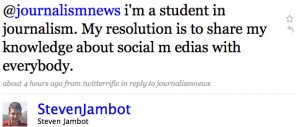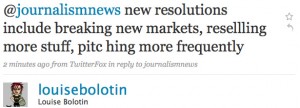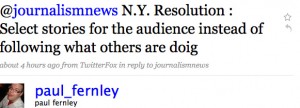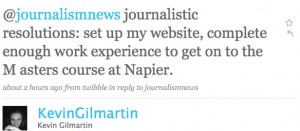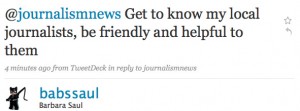Ben Bradshaw’s speech from the Royal Television Society’s binnenial convention in Cambridge last night, his first since becoming the British culture secretary in June. In his speech he criticised James Murdoch’s recent comments in Edinburgh and discussed regulation, regional news and public service broadcasting. The headline grabbing comments concerned the BBC: Bradshaw said that there could be a case for a ‘smaller licence fee’ and also suggested that the BBC Trust model is not ‘sustainable’.
Twenty years ago I had the good fortune and privilege to be the BBC correspondent in Berlin. I had arrived there in the beginning of 1989 – as a rookie reporter from BBC Radio Devon – to a posting considered a bit of a backwater.
Not much had happened in Berlin since the wall had gone up. My predecessor’s biggest story in four years was the death of the elderly Nazi, Rudolph Hess, in Spandau Prison. Within weeks of my arrival, the East Germans were revolting and in just a few short months the Berlin Wall was down. In career terms – it was very lucky timing.
I’ve been recalling the events of 20 years ago quite a lot recently. Not just because of the impending anniversary, but because of the loud and bad tempered debate in Britain about the future of public service broadcasting in general and the BBC in particular. I have many memories of that time in Berlin, personal and professional.
But one of the most abiding is of the stream of East Germans in the days after the Wall came down, who were able, for the first time, to visit the BBC office in West Berlin. They came to say ‘thank you’ for the programmes that had sustained them during decades of Communist rule.
When I asked them why they listened to the BBC, rather than the much better resourced Deutsche Welle, or the West Berlin stations or the Voice of America, they gave a variety of answers, but there was a common theme: “You don’t preach to us. You don’t treat us East Germans as second class Germans. Your news is fair. You don’t pretend everything in your own country is perfect, so we believe what you say about other things. You allow different voices.”
Broadcasting – changing world
The two decades since the fall of the Berlin Wall have seen a profound and accelerating change in our media landscape. You know better than most the journey from the analogue world of three heavily regulated broadcasters and a small add-on commercial market, to the digital world where the market is much larger, with a multimedia element, and where the public intervention is represented essentially by the BBC, with a self-funding Channel 4 gingering up the public service end.
It has been a transition from what could be called a command and control to a mixed economy. In that transition some things have been lost or endangered – plural provision of children’s programming, high-end drama and, across all media, the viability of commercially provided news, locally, regionally and in the Nations.
But the changes have also brought huge gains for the consumer and for the industry. There is a choice of programming and of technology-driven convenience and quality unthinkable back then. Although current trading conditions are tough, the industry is fundamentally healthy both commercially and creatively, winning Oscars, Emmys and Golden Globes.
Our production sector makes the UK the world’s largest programme exporter after the US and by far the leading exploiter of programme formats, with over half of the global market. This mixed economy has served the interests of the public, both as citizens and as consumers. It would seem to be what people want.
When we do intervene or regulate, we try to do so in a way that best allows the market to grow, to evolve, to expand. And we try to do so in ways that sustain the core values to which the public continue to attach importance – impartiality in news, effective protection for children and so on. In the last 20 years, the private/public mix has continued to innovate to anticipate and reflect public taste.
Technical innovations such as Sky Plus, High Definition and the iPlayer; an impressive range of innovation in content, from new talent to new formats; new regulatory models encouraging the growth of the independent sector outside London. And – at the centre of public provision – a strong, stable BBC with the security of income fixed for several years at a time to ensure its independence, both politically and commercially.
As we come towards the end of the transition from the old analogue world to the fully digital world, the challenge is to secure a consensus on whether our mixed economy remains the right approach – which I believe it is – and how to maintain it for the long term.
This is an appropriate point at which to thank Stephen Carter and his team for their excellent work in Digital Britain which provides both the long-term framework for government’s policy on the digital economy and our next steps.
Competing visions for future of public service
Just as we are approaching the 20th anniversary of the fall of the wall we have just marked another significant 20th anniversary – that of a Murdoch making a speech about the media in Edinburgh.
Murdoch speeches in Edinburgh are designed to be – how should I say – thought provoking. And James’ certainly was. Among his most striking assertions were that profit is the only guarantor of independence; that people are better informed if broadcasting is left to the market; that regulation needs sweeping away; and what he called state sponsorship – by implication the BBC – must be far, far smaller.
Profit the only guarantor of independence? I’m not sure that the market has secured the independent quality broadcasting that citizens in some modern democracies might expect. As for the market informing people better – that has not been my experience travelling around the United States, compared with the more regulated mixed media economies of Europe.
No, I do not believe that the market alone can deliver the plural sources and high standards of independent and impartial news and current affairs, let alone the richness of innovation and quality in other areas like drama, comedy, natural history and children’s programmes for which Britain is envied worldwide. There are important areas of content as well as infrastructure that the public says it values, wants and expects, and that the unregulated market will simply not provide.
Future of public service broadcasting
I challenge James Murdoch’s use of the term Orwellian to describe Britain’s media landscape. Being publicly funded or subject to statutory regulation does not equate with state control. East German TV was state controlled. That’s why those East Germans valued the BBC – it was free, diverse, self critical.
And the British people understand the distinction between publicly funded and state controlled too. Otherwise they would not consistently say they trust the BBC more than any other media organisation – more than ever according to the latest survey, in spite of the summer media onslaught on the corporation.
So James said things with which I profoundly disagree. But he also did us all a favour by asking legitimate questions and raising genuine concerns that our public discourse has been skirting around for too long. He was right to raise questions about the BBC’s size, its remit and its impact on the rest of the British media industry.
In the 20 years since I was reporting Berlin, the BBC has gone from being a service of two television channels, four national radio stations, a local radio network, a teletext service and some videotape sales, to a BBC with eight linear TV channels, several interactive and high definition channels, nine national radio stations and a dominant local radio network, the iPlayer, a world-leading online presence, and a commercial publishing, DVD , television and multimedia empire of some scale.
And if it were to continue on anything like that trajectory, the rest of the industry would be right to be worried and the mixed economy would be seriously imbalanced. Since James Murdoch’s speech the BBC has another review of itself, including, we are told, looking at its size.
And then Sir Michael Lyons comes up with his £5.50 ‘give-a-way’ and appears to be arguing he would rather the licence fee were smaller than the BBC share any of it to save regional news. What’s to be made of this? Is this really about the long term interests of public service content? I would just like to point out that the £5.50 is not the BBC’s to give away.
It was agreed on top of the current licence fee income for the BBC to fund help with digital switchover. However, Michael, if you want to return £5.50 from the BBC’s share of the licence fee to the public – or more if you wish – let me know and I’m sure it can be arranged!
This is not a serious or sensible way to have a debate about something as important as the future of the BBC and public service broadcasting. I happen to think the BBC probably has reached the limits of reasonable expansion. I believe the corporation is right to be looking more carefully at what it pays its stars and executives. It is time for the BBC to allow the National Audit Office access to its accounts. I’m also concerned about the regulatory structure of the BBC.
Although the Trust has performed better than its predecessor, I don’t think it is a sustainable model in the long term. I know of no other area of public life where – as is the case with the Trust – the same body is both regulator and cheerleader.
And finally, there may indeed be a case for a smaller licence fee. But there is a proper timetable for determining that. One of the unbroken conventions adhered to by successive Governments, to avoid the suggestion of political interference in or pressure on the BBC, has been to respect the multi-annual settlement system. I resolutely believe that to be right. Any attempt to break that convention would rightly be seen as a direct assault on the BBC’s independence.
However, there will need to be a decision in around two years time on the licence fee after 2012. During the next Parliament the shape of the new Charter with the BBC will need to be agreed. This will beg even bigger questions than those I’ve already just posed. Do we as a nation still value public service broadcasting? Do we want the BBC to survive and, if so, what do we want it to do and how do we want to pay for it?
These are very profound and hard questions to answer. Harder than at any time since the BBC was born given the speed with which the media environment is now changing. They cannot and should not be resolved by the BBC reviewing itself. Nor by speeches by media moguls or politicians. The public also needs to be heard in this discussion. They pay for it after all. They are the customer.
This means that the process, the discussions and consultation in the run up to the end of this licence fee and charter period will need to be even more open, even more fundamental than those we conducted before the current settlement. A proper national conversation, certainly not a stitch up behind closed doors between BBC management and politicians. Only that way will whatever is agreed have the legitimacy to withstand the onslaught from the BBC’s enemies and critics and stand the test of time.
The regulatory structure
I have spoken about one way in which government intervenes in the market for public benefit – public service broadcasting, now let me turn to the other, regulation.
There are those who argue that because of the revolutionary changes to the broadcasting landscape the traditional approach to regulation is outdated. I agree: but our approach is not traditional. At the same time, however, this does not mean to say that we can or should do away with regulation all together.
It is often those who call loudest for deregulation and non-intervention in areas that affect them who are quickest to call for intervention and regulation where it benefits them. The fact that we have some of the lowest wholesale broadband prices in Europe is not an accident or the product of the market. It is the product of regulation that has enabled vigorous competition – including from new entrants.
There is a serious point here about the right kind of regulation. When it comes to regulating for convergence, it is worth remembering that in establishing Ofcom Britain led the way in Europe by bringing content, delivery and wireless spectrum regulation together in one place. Ofcom has done so with two-thirds of the staff and lower costs then the five bodies that preceded it. And it is our approach to wireless spectrum, of liberalisation, deregulation and market mechanisms that have become the new European model.
Of course regulation needs to evolve as consumers’ habits change. The key is to move with the public. They expect broadcasters to have a duty of care when running phone-in programmes. They still value the watershed. They still expect protection against offensive material beamed unbidden into their living room, as opposed to what they actively go and get from walking to the newsagent or surfing the internet. They enjoy the rumbustious opinion and style in the print media. But they trust the impartiality of broadcast news.
This is the strength of the mixed economy. However, that does not mean we are interested in regulation for regulation’s sake, which is why I want to change our approach on product placement. We’ll consult on this shortly and would hope to have any change in place in the New Year.
To the critics of our regulatory structure I ask the simple question: if regulation were a problem in itself, how is it our media market is amongst the most successful in the world? It is because we have got the right balance between public and private. We have stayed ahead of the game and, as our Digital Britain plans show, we are determined to maximise the future potential of the broadcasting industry.
A draft Digital Economy Bill is taking shape, ready for the next session of parliament. In addition to tackling unlawful file-sharing it paves the way for universal broadband – future-proofed – and for delivering digital radio and next generation-mobile services. Digital Britain commits us to a new remit for Channel 4, building upon the vision of Next on 4, moving it firmly into the digital age.
Andy Duncan was, of course, the driving force behind Next on 4 and I’m very grateful to Andy for the leadership he has shown Channel 4 through a period of unprecedented change in the media world. He has been instrumental in repositioning Channel 4 for the digital age and I’m sure we all wish him all the best for the future.
This time last week the switch to digital TV reached its millionth home. The analogue system is only three years away from being switched off entirely. Three out of every four sets in the country now receive multichannel television – nine out of 10 households. And the Switchover Help Scheme we established has now helped more that 100,000 older and disabled people to switch, providing equipment, installation and aftercare.
Next month we will have many of the most influential global figures around the table at the inaugural c&binet conference – our Davos of the creative industries – aimed at identifying and supporting the most effective way of protecting, producing and commercialising creative work.
Regional and local mediaI mentioned earlier the threat to plural news programmes in the regions and nations. As a former local newspaper and local radio journalist I would be acutely aware of the importance of good local news to the public, even without my constituents reminding me on a regular basis.
The high viewing figures for regional news are no accident. People want to know what’s happening in their patch. It helps maintain a sense of local and regional identity and pride. It plays a vital part in a democracy at holding local authorities, the NHS and other public organisations to account. It’s reporters and presenters have a far more intimate relationship with the viewers than those on the network.
When in the South West earlier this year Carlton amalgamated its former two news regions into one – based in Bristol – my constituents were not happy. They lost their dedicated ITV evening news programme produced and edited from Plymouth with an even more local opt out from Exeter. While the Carlton journalists do a valiant job of reporting their vast new region with limited resources, we all know that the economics of local and regional news are getting less and less sustainable. The poll we published yesterday showed 84% of the public think it’s important to have a choice of sources of regional and local news.
Seven out of 10 people want regional news on more than just one channel. And one cannot will the ends without the means. Two thirds of those questioned supported our idea of using the equivalent fraction of the licence fee that’s currently ring-fenced for switchover to secure plural regional news for the future. We said when we announced this in Digital Britain that we thought this was a fair, transparent and sustainable solution, but that we were open to other ideas.
We still are. I note Mark, your interesting suggestion of floating some of BBC Worldwide and I look forward to hearing more about this proposal. But we are determined not to lose plural news provision in the regions. It seems crazy that people all over the world can access the brilliant BBC website if we cannot provide a choice of quality regional news to people here at home.
The consultation closes 22nd September – after which it’s essential we press on with plans for three pilots of local news consortia, one each in Scotland, Wales and an English region, which we hope can begin in the course of next year.
Skills and talent
Plurality is not the only virtue of the local news consortia idea. They will also provide a valuable opportunity to find new skills and talent, opening up opportunities in the media to young people in cities like mine.
I very much hope that the Government can help you help the next generation of local journalists using not just these new consortia but in all the good work you already do to encourage young people and build skills.
The creative industries, the digital economy and the media are areas where this country is by nature and history strong. They make a large and increasing contribution to our national economy and will provide a significant proportion of the employment growth in the future.
That’s why, as part of the Government’s future jobs fund – my colleague Yvette Cooper and I have agreed to fund between 5,000 and 10,000 new jobs in the creative sector. I know some of you are already involved in this venture and I would urge more of you to come on board. The scheme will not only help thousands of young people whose employment prospects have been the worst hit by the global down turn – but they will help you and us find and nurture the creative and media talent of the future.
ConclusionI have argued tonight that public service broadcasting has informed, entertained and enriched Britain, and generations of Britons. The BBC has been central to that in the past and I hope will continue to be in the future.
Equally, the market has brought huge benefits. When those East Germans were streaming through the Berlin Wall 20 years ago, there were no mobile phones, let alone blackberries or multi-channel digital televisions. High-speed broadband, downloads and video-on-demand were glints in the eyes of the visionary few rather than central to all of your business models. It is the market that has driven and delivered this change.
This mixed economy – free but regulated, public service and private – has served Britain well.
In his Edinburgh speech, James Murdoch described it – actually you, Britain’s broadcast media – as the ‘Addams Family’ of the world’s media. I don’t know how you felt about that. And I assume he didn’t mean it kindly. But aren’t the Addams family a well-loved, long running, world-wide hit? And haven’t you, this British Addams family, won seven out of the 10 international EMMYs two years running? And don’t you export £1 billion of TV content every year? So, maybe on this definition of the Addams family, I finally find something on which James and I wholeheartedly agree.
Thank you.
